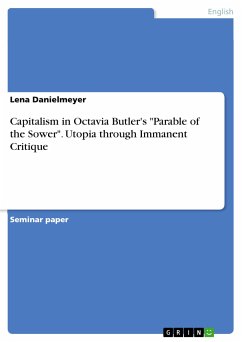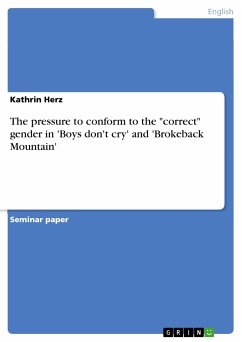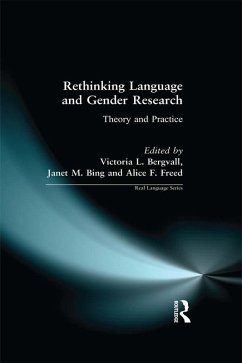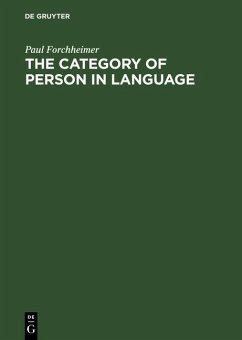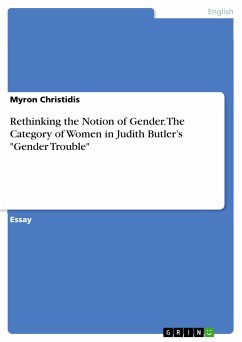
Rethinking the Notion of Gender. The Category of Women in Judith Butler's "Gender Trouble" (eBook, PDF)

PAYBACK Punkte
0 °P sammeln!
Essay from the year 2022 in the subject English Language and Literature Studies - Linguistics, grade: 80%, The University of Liverpool (English Department), course: Language in Society, language: English, abstract: This essay will examine and evaluate Butler's theories in the chapter Subjects of Sex/Gender/Desire in her book "Gender Trouble" with specific regard to a statement regarding the 'category of women'. Throughout the ages of modern human history, gender has mostly been perceived as a static, binary category. Especially western human societies in these times for the most part have cons...
Essay from the year 2022 in the subject English Language and Literature Studies - Linguistics, grade: 80%, The University of Liverpool (English Department), course: Language in Society, language: English, abstract: This essay will examine and evaluate Butler's theories in the chapter Subjects of Sex/Gender/Desire in her book "Gender Trouble" with specific regard to a statement regarding the 'category of women'. Throughout the ages of modern human history, gender has mostly been perceived as a static, binary category. Especially western human societies in these times for the most part have consisted of men and women, a dichotomy that was fit in a strict hierarchical system, with men dominating the said to be 'weaker sex'. However, with society approaching the second half of the 20th century and thus a more progressive period, the concept of gender has become a widely discussed topic. Researchers have applied different theories and approaches to try and define gender and its meaning for human interaction and conversation. At the outset of variationist gender research, gender was still believed to be a static concept. Early sociolinguists like William Labov were examining how language, in terms of linguistic features like phonetics and syntax, was shaped by a speaker's identity. This approach was followed by a more conversational concept, investigating certain linguistic strategies and the differences between male and female language. Only rather recently have researchers begun to wonder if maybe language was not an indicator for gender but might rather be constructing it actively. This, then, would shift the understanding of gender as a stable invariable. Judith Butler is one of the most influential researchers to define gender as a fluid category, constructed by and in society. Butler raises the question of what it is that actually constitutes gender and the notion of femininity in specific. This implies that the answer may not lie in the apparent, anatomical indicators that have been used to define gender - or sex - for the longest time. Instead, it might be the discourse and the use of language that construct gender, and thus identity. Butler, of course, negotiates the connection of gender, feminism, and politics. For means of conciseness, the essay will mainly focus on language use and the notion of gender as a performative construct.
Dieser Download kann aus rechtlichen Gründen nur mit Rechnungsadresse in A, B, BG, CY, CZ, D, DK, EW, E, FIN, F, GR, HR, H, IRL, I, LT, L, LR, M, NL, PL, P, R, S, SLO, SK ausgeliefert werden.




